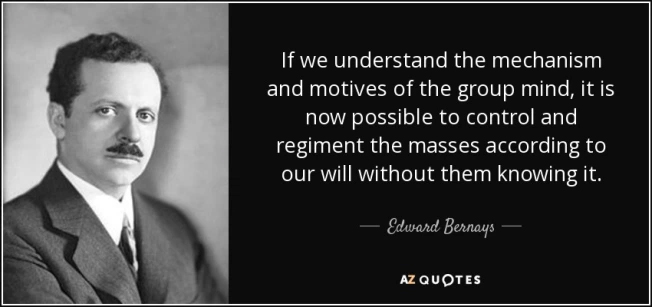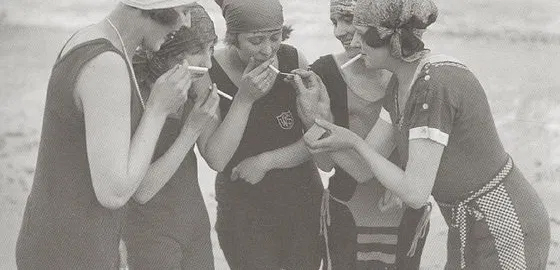Do I Really Need This?
Do I really need this information, glass of wine, beer, new dress, thing I am just about to buy? Ask yourself this question and notice your body’s reaction. As Americans, we excel at consuming. We have been trained to consume based on Freudian principles. I propose we retrain ourselves to want less and consume less, by asking the simple questions, “Do I need this?” and noting our body’s reaction. Tap into your inner wisdom by asking your body and listening for the answer. If it doesn’t make your heart sing, don’t buy it, don’t consume it.
Before the 1920s, we were less of a consumer society. We bought things that lasted, that we needed to survive. Surprisingly, we were programmed to be ultra consumers by the marketers of the early 20th century based on the principles of Sigmund Freud.

Freud’s nephew, Edward Bernays (pictured above), credited with being the father of public relations, wondered if the principles of propaganda, used during wartime, would work on the regular population during times of peace. Bernays goal was to shift America from a needs-based culture to a desire-based culture to sell more product for his clients. He believed that people must be trained to want things, man’s desires must overshadow his needs, and passive consumers are the key to capitalism. Bernays used the Freudian principles of psychoanalysis to drive consumerism.
His first experiment was with cigarettes in 1929. A cigarette company came to Bernays concerned that they were missing half the population of consumers due to smoking being largely a masculine endeavor. Bernays arranged to have a group of suffragettes/socialites light up during an Easter parade using the cigarettes as “torches of freedom.” He had the press all lined up to spread the word. These torches of freedom represented equal rights for women, freedom, and empowerment. This led to multitudes of women joining ranks with these influencers and picking up the torch (smoking cigarettes.) Women smoked then after.

Bernays went on to craft the industry of public relations and create a movement of what he called, consumptionism. This story is well presented in the series, 2002 British television documentary series, The Century of Self, by filmmaker Adam Curtis. The documentary is filled with information on how easy it is to manipulate the minds of people.
We are still living by these Freudian principals and the desire-based culture started by Bernays. I am not suggesting we go back to a strict needs-based culture. Only that, we make better choices for ourselves using our internal knowingness of what is in our best interest.
Aside from the over-consumption issue, it is exceedingly important to watch what you consume of food, media, and alcohol. We live in a culture that glamorizes alcohol and floods us with dramatic and divisive media 24/7. It is our personal responsibility to limit how much of this we take into our bodies.
In a taping of Wait, Wait, Don’t Tell Me a few years back, Colorado Governor John Hickenlooper was the guest and they were talking about the newly passed legislation of recreational marijuana. Paula Poundstone asked the question, “Doesn’t anyone value a clear mind?” I wanted to stand up and cheer. We are at our best when our mind is clear. As leaders, lightworkers, and way-showers, we need to keep a clear mind to enable the best energy and information to flow through us.
I propose we create a heart-based or love-based consumer culture and buy only what makes our hearts sing. Marie Kondo talks about this very thing in her book, Life-changing Magic of Tidying Up. Notice how your body responds when you ask it the question, “Do I need this?” Let’s see how this changes things. You might even notice the collateral benefits of losing weight, having a clearer mind, and a richer bank account.
